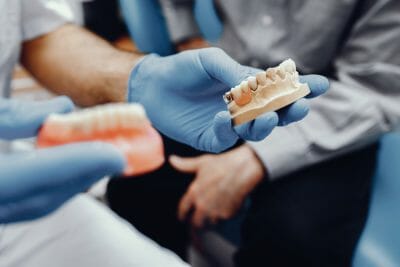Denture implants have transformed the world of dental medicine by offering a better option for people with tooth loss. This modern technology delivers improved oral function and aesthetic results. Dental implants provide more fitting and comfort by securing the dentures to the jawbone, allowing people to eat well and talk more confidently. In this article, you will understand denture implants and how they improve oral function.
How do dental implants work?
Denture implants replace lost teeth when a patient lacks enough healthy teeth or bone density to support conventional dentures. These implants offer a more durable and secure fit, enhancing comfort, functionality, and appearance for individuals with missing teeth.
What are the types of denture implants?
Fixed Dentures: In this form, dental implants are surgically inserted into the jawbone, after which a fixed denture is permanently fastened to the implants. The most stable and functional implants for fixed dentures are similar to natural teeth. Since they don’t need to be taken off for cleaning, they offer a powerful biting force and are more comfortable.
Removal of denture implants: Denture implants that can be removed for cleaning and maintenance are known as removable implants. They join the denture to the dental implants via a series of attachments.
All-on-6 denture implant: Denture implants that are All-on-4 or All-on-6 are a particular kind of fixed denture implant. They require inserting four or six dental implants into the jawbone and affixing a whole arch of teeth (either the upper or lower arch) to the implants. This method is frequently employed when a patient has considerable tooth loss or bone desorption since it offers a practical and affordable treatment.
Miniature dental implants are shorter and slimmer than standard dental implants. When insufficient bone is available, or full-sized implants are not appropriate, they are used. While MDIs can help keep removable dentures stable, they are not as strong as traditional implants.
To choose the best type of denture implant, depending on a person’s needs, jawbone health, and budget, it is crucial to speak with a dental implant specialist. You can easily find a dental office in your vicinity by searching ‘denture repairs near me‘ online. Denture implants that are properly maintained can endure for many years and considerably enhance the quality of life for those who lack teeth.
What are some Benefits of dental implants for oral health?
There are various advantages of dental implants for improved oral function. These advantages consist of:
Improved Chewing Efficiency and Stability: Dental implants firmly fix denture implants in the jawbone, resulting in Better chewing efficiency resulting from this stability, which stops the dentures from slipping or moving while you’re eating. Therefore, people can comfortably eat a larger variety of meals.
Preservation of Jawbone and Facial Structure: The jawbone beneath missing natural teeth may eventually degrade without stimulation. Denture implants stimulate the jawbone like natural tooth roots, maintaining face structure and bone density to avoid the sagging appearance frequently linked to severe tooth loss.
Better Oral Health: Denture implants do not pressure the gum tissue; they promote better oral health and lower the chance of gum-related problems.
Improved Self-Confidence: Denture implants provide a more attractive and natural-looking grin. These implants’ enhanced stability and functionality strengthen a person’s confidence and help them feel more at ease in social circumstances.
In conclusion, denture implants offer people lacking teeth a dependable and useful alternative, greatly enhancing oral function and improving the quality of life. However, speaking with a skilled dental practitioner is crucial to assess your needs and establish whether denture implants are the best option.
